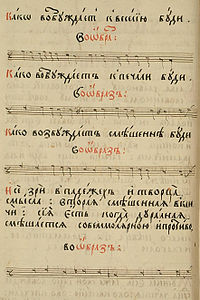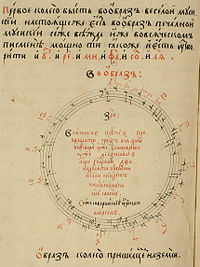- Nikolay Diletsky
-
Nikolay Diletsky (Ukrainian: Микола Дилецкий, Mykola Dyletsky, Russian: Николай Павлович Дилецкий, Nikolay Pavlovich Diletsky, Nikolai Diletskii, Polish: Mikołaj Dylecki, also Mikolaj Dylecki, Nikolai Dilezki, etc.) (c. 1630, Kiev – after 1680, Moscow) was a theorist and composer of Ukrainian nationality, active in Russia. He was widely influential in late 17th-century Russia with his treatise on composition, A Musical Grammar, first survived version of which dated 1677. Diletsky's followers included Vasily Titov.
Contents
Life
Little is known about Diletsky's life. A remark by Ioannikii Trofimovich Korenev, a fellow theorist who describes him as a resident of Kiev, is considered evidence of the Diletsky's Ukrainian origins. Korenev's statement is probably reliable, as he and Diletsky apparently were well acquainted.[1] However, the date and even the year of birth are not known, and no details on Diletsky's early life have surfaced. He must have moved to Vilnius before 1675, because that year his Toga zlota ("The golden toga") was published there. The text is now lost, but it is known that it was written in Polish, and the surviving title page[2] indicates that it was probably a panegyrical pamphlet.[3] He also wrote here now lost musical treatise, apparently in Polish, as some sources indicate.[4] This treatise is first mentioned in Grammatika musikiyskago peniya (1677). The Idea grammatikii musikiiskoi (1679) is described as a translation of the Vilnius work in its title page.
After Vilnius, Diletsky lived in Smolensk, where in 1677 the first survived version of his magnum opus, Grammatika musikiyskago peniya ("A grammar of musical song"), was written. He then moved to Moscow, where the subsequent two versions of the work appeared in 1679 and 1681. Nothing further is known about Diletsky's life, and it is generally assumed that he died shortly afterwards. His date of birth is projected from this hypothesis.[5]
Work
Although several of his compositions survive, Diletsky's fame rests chiefly on his composition treatise, Grammatika musikiyskago peniya (A Grammar of Music[al Singing]), which was the first of its kind in Russia. The three survived versions bear different names, but the content is roughly the same with some important differences.[6] The treatise is in two parts. The first teaches the rudiments of music theory, "relying heavily on Western terminology and theoretical precepts, especially the hexachord", and the second teaches composition of a cappella concertos, a genre that came to Russia through Ukraine and of which Diletsky was one of the first exponents.[6] Diletsky provides a wide variety of examples, both from his own work, including an 8-voice setting of the Divine Liturgy that he composed in Smolensk specifically to illustrate the "Grammatika",[7] and from that of contemporary Western composers, particularly the Poles Marcin Mielczewski and Jacek Rózycki. Apart from the tremendous influence it had on subsequent generations of Russian church composers, the Grammatika is of particular interest for having the first known description of the circle of fifths, one that antedates Western examples by several decades.[8]
List of works
Writings
- Grammatika musikiyskago peniya (Грамматика муcикийского пения, "A grammar of musical song", Smolensk, 1677)
- Idea grammatikii musikiyskoy (Идея грамматикии муcикийской, "An idea of musical grammar", Moscow, 1679)
- Grammatika peniya musikiyskago (Грамматика пения муcикийского, Moscow, 1681)
Music
- 3 settings of the Divine Liturgy (4–8 voices, includes "Kyivan Chant" and a "Proportional" liturgy)
- 2 sacred concertos
- Resurrection/Easter kanon, 8vv[9]
Notes
- ^ Jensen 1992, 310.
- ^ Jensen 1992, 311.
- ^ Jensen, Grove.
- ^ Jensen 1992, 309.
- ^ Jensen 1992, 310: "Oleksandra Tsalai-Iakimenko and Oleksandr Zelin'skii, "'More neprebrannoe' (Novoznaidenii avtograf tvoru Mikoli Dilets'koho)," Zhovten' no. 7 (1966): 109-I6, suggested that Diletskii died in the third decade of the 18th century, based on their belief that Muzei ukrainskoho mistetstva 87/510804, dated 1723, is an autograph. They propose a correspondingly later birth date, in the 1650s. This hypothesis, taken up in their later works, was refuted in Vladimir Goshovskii and I.A. Durnev, "K sporu o Diletskom," Sovetskaia muzyka no. 9 (1967): 138."
- ^ a b Jensen 1992, 307.
- ^ Jensen 1992, 312.
- ^ Jensen, Grove. Johann David Heinichen described the circle of fifths in a 1728 treatise.
- ^ List of works taken from: "Mykola Dyletskiy: Sacred Works", Kyiv Chamber Choir. 2003, Atlantik (Атлантик), CCK 11-2; CCK 11-3.
References
- Claudia R. Jensen. A Theoretical Work of Late Seventeenth-Century Muscovy: Nikolai Diletskii's "Grammatika" and the Earliest Circle of Fifths, JAMS, xviii (1992), 305–31. (subscription required)
- Claudia R. Jensen. "Nikolay Diletsky", Grove Music Online, ed. L. Macy (accessed 17 December 2006), grovemusic.com (subscription access).
- Dytyniak Maria Ukrainian Composers - A Bio-bibliographic Guide - Research report No. 14, 1896, Canadian Institute of Ukrainian Studies, University of Alberta, Canada.
Categories:- 1630s births
- 17th-century deaths
- Russian music theorists
- Ukrainian composers
- Russian composers
- Baroque composers
- Classical composers of church music
Wikimedia Foundation. 2010.


